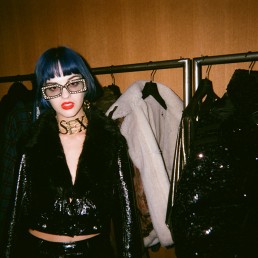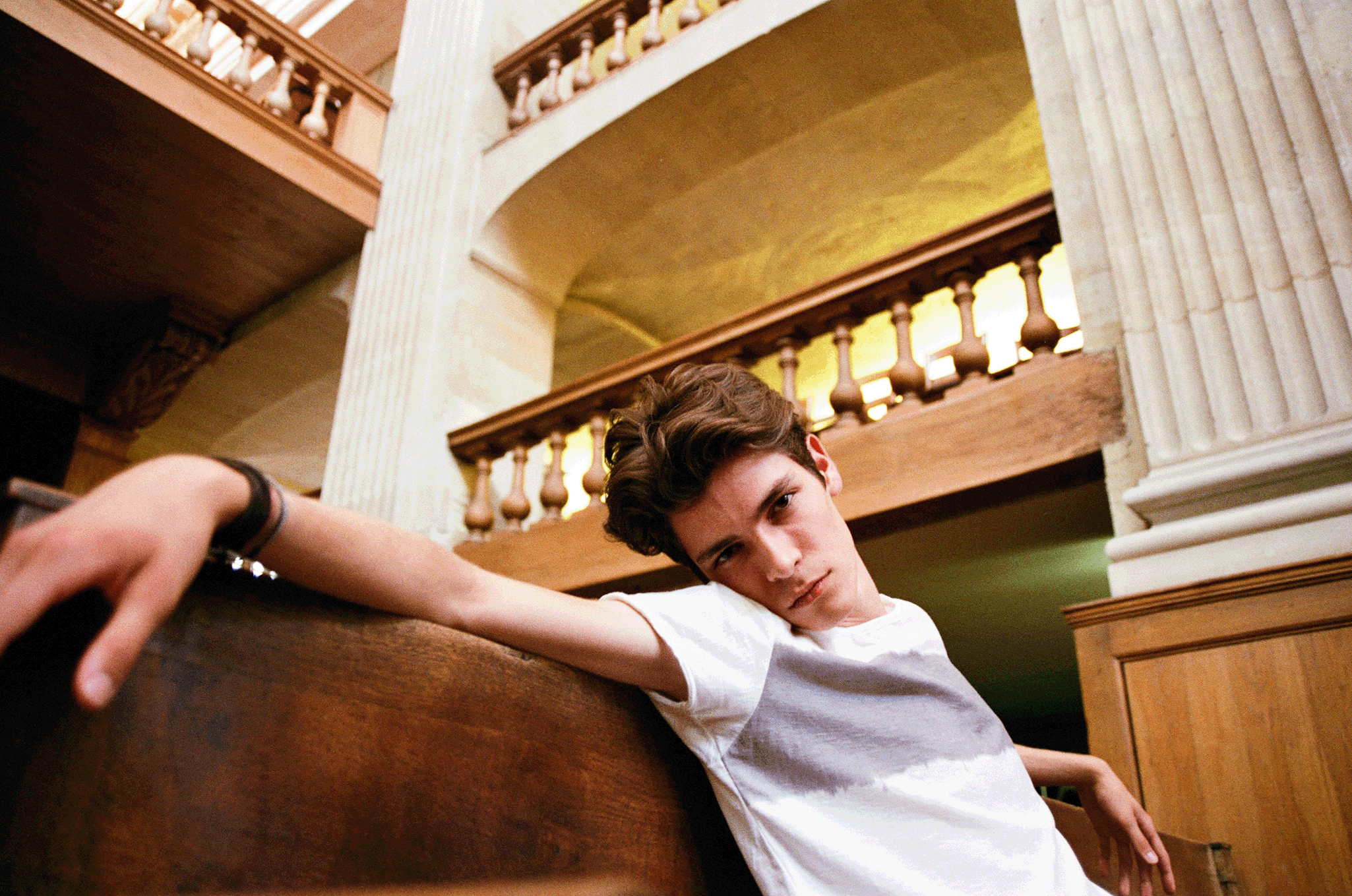We hope everyone still picks up books these days, or at least audio books, and if you do, Erin Reinelt is one of our favourite up and coming writers. Her new book Strings Attached explores polyamory with wit, scary honesty and lots of sex. We caught up with Erin to discuss her book and talk about her life ‘post hot mess’! And she might just have you start using the word “cuntrag”.

For those that read your debut novel Low Expectations, we know that you started out in fashion with stints at McQueen and Jonathan Saunders. When did you decide to pursue writing? For most it wouldn’t be the wisest of career choices. How did you also know it was something which you were good at?
I was always more naturally skilled at writing than the arts to be honest, but there’s a twisted part of me that’s like, ‘How can I make my life most difficult?’ And fashion interested me more at the time. While I’d written for pleasure when I was young, in London you start drinking and going clubbing in your teens. I was more of a raconteur than a writer, it was a crazy-story-collecting period! I had done several long-term fashion internships and by the time I graduated, I knew it wasn’t for me. I moved to Paris to try my hand at a novel, while working as a nanny for a French family. Writing Low Expectations as an experiment took the pressure off!
This was before the new wave of grotty-but-fun women’s stories emerged, and I was convinced there was a gap in the market reflecting my experience as a woman in her 20s; the bad sex, good drugs and messiness of it all. It was strategic in the sense that my instincts are good. As for wise choices, I’ve only started to make them in the last year or two! My ignorance of the publishing industry in general probably helped. It doesn’t feel as risky when you have no real idea of how hard it is.
Going back to fashion, the industry stereotype is quite bitchy, but really theres some dark humour to it, perhaps as a coping mechanism. Would you say it helped to shape your humour with pop culture references and textured descriptions?
Any high-pressure industry can bring out the claws and gallows humour, but for some reason fashion has the reputation of being uniquely catty and superficial. If you’re a skilled designer, you’ll be drawing inspiration from great cinema, art, photography and history as well as pop culture. Some of the most cultured people I know are fashion designers! So that broad eye and interest in the brilliant and absurd, sacred and profane, has certainly shaped my influences when writing novels, and now scripts, that spark the imagination.
As for my humour, I’m always drawn to people who let themselves be profoundly silly and just like to have a good time! Mostly we’re mocking our own lives. It’s no accident that cultures who have gone through horrific generational traumas are often hilarious. What can you do but laugh? There’s no other healthy response. It’s laughter or suicide. Those are the stakes.
Let’s face it, magazines are always selling us this dream of the cool girl. How would you describe a cool girl?
In these hyper self-aware times, when there is a lot of pressure for people to self-objectify and brand themselves, those who are really at ease are most alluring. A cool girl to me is someone who is unabashedly herself in whatever way is unique to her, who follows her own instincts, who is playful. I think playfulness magnifies everyone’s best qualities. Anti-sex is someone who looks great but is having no fun. Soon we will be dust! Grasp joy where you can!

Low Expectations and Strings Attached are in the same spiritual universe but with different descriptions of sexuality and periods in life. One is laugh out loud, the other is more of that awkward, honest inner laugh. Can you tell us a bit about the time in between?
I started writing Low Expectations when I was 24 and was drawing on those late teens/early twenties firsts: jobs, relationships, regrettable sexual encounters, wild nights out and totally honest friendships. What is similar in my writing style is that I aim to entertain, and I hate to be a downer. But Strings Attached is, unsurprisingly, more grown up and hopeful in a different way. It’s that mature hope that encompasses a lot of heartache and failure!
My life has been somewhat peripatetic and restless. Part of that was due to a dipsomaniacal drinking habit. After Low Expectations came out, I lived in Paris for another year or so and wrote a follow up, which I was contracted to do for a German publisher. Back in London, the U.K. editorial response was that it was too dark and hard to market, a story more suited to T.V. or film. A disappointment at the time, but it planted the seed to study screenwriting properly. I had written a T.V. pilot and bible for a French producer, but I was more or less blagging it. There comes a point in life where all you want is someone to tell you that yes, you’ve been doing this properly, or no! This is the way.
I moved to Brooklyn and soon after had an attack of acute alcoholic pancreatitis, stayed sober for maybe six weeks, then spiraled into what felt like an extended nervous breakdown. It was a very lost time for me, and my love life was incredibly messy! It’s that thing of love and addiction being all bound up together and breaking your heart over and over, as you try and fail to make the right choices. Studying screenwriting gave me a new direction; it brought together the visual arts and design side that I had developed while immersed in the fashion world, with my strengths of character and dialogue.
After a year and a half and still a wreck, I returned to the U.K. to go to rehab. When I got out, my agent emailed me saying that my now editor wanted to meet, to discuss third book ideas. Which felt like an undeserved lifeline from the universe! I proposed different novel themes, one featuring a character in her 30s exploring sexual and romantic adventures, including polyamory. She was intrigued and asked me to write an outline and sample chapters.
The publishers bought it, and that’s how Strings Attached was born! It was definitely a fake it to make it situation. I was still in an incredibly fragile emotional state and unsure if I could write something as complex as a novel again, stay sober, mend my fun-ravaged life, all the while pretending to be a safe bet. Luckily, I am excellent at facades! And I was able to deliver.
So, time in between: three countries, a dud novel, a broken pancreas, one small alcoholic nervous breakdown, tons of drugs, perhaps ten heartbreaks, a new career direction, and rehab! That list makes it sound like I wasn’t also having a fucking great time, which is untrue. And why it was so hard to stop.
Its true, from the outside it looks like a great time, and most of all people think it is easy and fun, which isn’t the truth at all, but whenever we open up people like to say that we are “negative” or in my case “not easy to work with”.
Going back to fiction, the problem with your Bridget Joneses and Carrie Bradshaws, was that wedding bells or rescues were always being imagined in the distance. Nothing could be more boring for Gen Z. Strings Attached is themed around polyamory, which lets face it, wasn’t in many people’s vocabulary a decade or two ago, except (which the novel covered) what we would expect from some crusties. Yet, many marriages that don’t end in divorce have gone through polyamorous moments. There are different feelings when approaching this as married, single, newly singled, and newly married. How did you begin to even research?
I probably wouldn’t have written about it if I hadn’t found myself in that style of relationship. Our generation is experimental, fluid and curious in many different ways and the book explores these changing sexual mores. We’re committed to making the best life we can for ourselves without unnecessary rules. Which is exciting but can also be careless and cause a lot of pain. The idea that radical honesty alone is enough, is naïve; there can still be power imbalances and exploitations.
Though I’ve never identified as polyamorous, I’m very rarely jealous. It was actually the most anxiety-free relationship of my life and I think that was because I knew it had no future. I felt very calm and in control of my emotions. I was much more concerned with whether my pancreas was going to explode again! While there was a lot of on/off drama, his having a girlfriend (later wife) never bothered me, I was kind of incurious about their relationship. But that wouldn’t make for a very gripping read!
For the novel I drew on my experience of passionate love; what issues would arise when you find yourself falling for someone in the lunatic-making way, having entered into this type of arrangement? Something I really admire about polyamory is this enormous generosity in loving, and that you are willing to put your hearts on the line for freedom. Love becomes pure, a giving without expectation, rather than a grasping, tit-for-tat arrangement. But up until what point can you bear that? Love is generally hard to bear, I think, whether you are two people or five!
We are taught to be unapologetic but Jean can actually be quite polite. Neither house wife nor whore, wouldn’t call her either and not even a bitch and I don’t find her at all disturbed. I’m getting bored with neurotic and actually more excited by the banal and basic in all of us. Basic can also mean screw being a people pleaser. How did you approach her character development?
Jean is definitely an everywoman character, who has been a good girl her whole life and played by the rules, only to wind up totally dissatisfied. She starts off in quite a downtrodden place, put-upon and constantly twisting herself into knots to suit other people, particularly her alchie fuck-up ex, Charlie. It’s a journey of her taking control of her destiny through her sexuality in a fun, borderline-absurd way; she is the straight man thrown into high-drama situations, sex parties, orgasmic meditation retreats, a dodgy threesome, polyamory, and falling in love along the way.
Comedy often arises from that hideous contrast between dreams and reality, from sharply unmet hopes! Starting to write fresh out of rehab, I had a lot to work with. I put my own feelings of self-doubt, uncertainty and frustration into where her emotional state begins. Charlie is a fictitious personification of my addiction issues. It’s all a weird meld of my subconscious. Which includes the basic bitch! Basic bitch is the new normcore. It is truly not giving a fuck.
I can honestly say, I don’t miss dating after reading the book, although it did bring back many memories that I blacked out. What was your craziest date and feel free to replace it with worst!
The craziest was with my friend Josephine in Paris, we’d left a club at 3am to meet her boyfriend and go to a squat party; he had a friend she wanted to set me up with. So, we go to meet them in the 19th and they keep talking about waiting for the ‘guide’ and we ask, why do we need a guide for this address? Then the guide arrives and lifts up a manhole in the street. We climb down this long passage in heels, warned that if we fall, we die, and then walk 20 minutes through the sewers of Paris, eventually ending up at the underground entrance to an abandoned electricity station, or some factory, I can’t remember. We weren’t supposed to touch the exposed pipes because sometimes 200 volts would come through. That I remember!
We climb through the building, covering our mouths because of asbestos, up to the top where they’ve got a huge sound system and couches and graff all over the walls. Through a hole in the roof we could wedge ourselves up; there was an amazing view of all Paris, the best I’ve ever seen of the skyline. We all sat on the edge of the roof with our legs swinging and watched the sun rise. It was extremely dangerous in hindsight; our bodies would definitely have never been found if raped and murdered. But pretty extraordinary! Might die of asbestos though.
On a more serious note. One of my favourite descriptions in the book was “velvet cock”. What didn’t make the cut?
I always try to slip cuntrag in, but it never flies. Gonad goulash. I actually just thought of that, but it would have been perfect for the orgy!
Although there is a strong English tone and humour, you have had experiences on both sides of the pond. What were the most striking differences?
To broadly stereotype, in the U.K. telling a hilarious story is a journey of competitive failure, in the States it’s about self-confidence and an enthusiasm that appears suspect abroad. British people are confused by those who aren’t openly marbled with despair. To try and fit in, I’ve definitely pitched myself too hard, and then torpedoed into self-loathing to overcompensate. Like a doubtful schizophrenic. It’s a neurotic’s playground!
To contradict myself, the States is so huge and vastly polarised it’s impossible to make any sweeping statements. And probably some British people distrust those marbled with despair. I don’t know. These days people are more representative of the media they consume than their nation. But something I found so refreshing about L.A. was the startling lack of neuroticism. People would say ‘Totally radical!’ with no irony. I was like, I love this place! Death to cynicism. This is a place of hope.
Order your copy of Strings Attached HERE!





